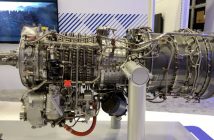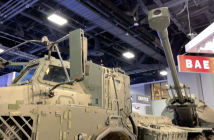Rick Nagel, the managing partner of Acorn Growth Companies, discusses investing to grow small companies and profit challenges as major firms pressure suppliers on cost with Defense & Aerospace Report Editor Vago Muradian at the 2019 Paris Air Show where our coverage was sponsored by Bell and Leonardo DRS.
Vago Muradian: Welcome to the Defense and Aerospace Report. I’m Vago Muradian here at the Paris Air Show at the historic airfield in Le Bourget outside the French capital where our coverage is sponsored by Bell and Leonardo DRS.
We’re here in Hall 3 at the Oklahoma State stand to talk to Rick Nagel, who is the Managing Partner at Acorn. A great company that owns eight other great companies. Rick, tell our audience just a little bit about Acorn and what you guys do.
Rick Nagel: Sure. We’re a private equity firm. We do exclusively aerospace and defense investments, principally concentrated in the United States but offices here in Europe as well. We take a long-range view on the marketplace, so we do do private equity. But instead of getting in and owning something for two or three years, we’re kind of a seven, eight, nine, ten year guy.
Mr. Muradian: Which puts you actually in a very, very unique category because you guys are really actively looking not just to squeeze companies but actually grow them to a point.
Talk to us a little bit about the environment we find ourselves in. Last year at Farnborough you said you guys were going to be on a growth track, you’re going to bring on some great new people some of whom are standing around here right now, and make some investments. Talk to us about the space, where we are strategically, and where you guys are going in it.
Mr. Nagel: I’m going to take that a couple of different ways. First of all, the same dynamics apply today that did then. You’ve got a tier three supply base that is largely owned by folks that are retiring. In many of those cases they don’t have the number two guy ready to take over, or junior is not going to inherit the business, so they’re looking for partners to come in and create seamless acquisitions, which are important for the entire industry. There are critical suppliers out there that need to make sure, the [OENs] need to make sure stay in good hands and are going to be with operators.
However, the market right now is a little choppy. And people are a little nervous that we’ve been in a great kind of dual bowl run with both aerospace, commercial and obviously defense, and folks are starting to look out on the horizon and wonder a little bit if that’s going to start to maybe go a little bit the other way.
Long range, everybody feels great, but what’s going to happen in the next 12 to 18 months is a little bit of a guess.
Mr. Muradian: And as you look to that 12-18 months, historically there’s been a little bit of countercyclicality between what we see on the commercial side. So if you’re a Boeing, for example, commercial floats you when defense is down, and vice versa. Whereas this time it does look like for the first time both of those cycles are going to trend down at the same time.
What are some of the things you guys are doing to at least indemnify yourselves somewhat should that happen?
Mr. Nagel: First of all, I think it’s like all things in a cycle, not everything in a cycle cycles, so I think you have to think about specifically what you’re doing and where you’re at. If you’re building parts for a commercial airplane and you’re a little worried about that long term, normally you hedge your bet by building stuff for defense article airplanes as well.
I don’t know with the production schedules the way they are right now, I don’t know that you’re going to see, for example, Joint Strike Fighter’s not going to cycle down if we start not taking deliveries on commercial. But there are just certain areas right now of the planet that are unsafe, they’re not going to get safe in the next 12-18 months, so I think it as it relates to data collection, data analysis, PEDs, cyber, those things are largely secure. Maintaining our aging assets when there’s nothing going to replace them is secure. Our OpsTempo’s not going to go down. So I do feel like there’s some natural hedges in here. People just need to be smart about looking inside the cycle for what won’t cycle.
Mr. Muradian: And where are we going to be in a year? So when we get together at Farnborough next year, what are we going to see? You made good on your pledge, like here’s a bunch of things we’re going to do. Whether it’s setting up offices or bringing new people on. Where are we going to be in a year?
Mr. Nagel: Well, at Acorn we’re going to continue to do what we’ve been doing. It’s been a great winning formula. We try to find great companies, great teams, invest in them and grow them. We’ll make the long-term bets that the entrepreneur before us wasn’t willing to make or couldn’t for whatever combination of reasons. If this thing does cycle, and I’m not saying that it will, but if it does, these companies are going to need capital partners like us to help support, undergird and make sure that they can weather the storm.
These storms aren’t very long typically, but given how thin the margins are right now, anything as simple as just stretching payment terms can be catastrophic and you need stability on your balance sheet.
Mr. Muradian: Last question. You mentioned that if you look at it, we’ve got some very major mergers and acquisitions, we’ve seen some very big ones, whether it’s Orbital, ATK, Northrop Grumman, now we have Harris and Le3. Full disclosure L3 is one of our sponsors. You have Raytheon and UTC that are getting together. We’ve talked to a lot of companies that are in that middle of the market in that third tier, and they will tell you it’s really tough because the primes jackhammer on you and that’s where they try to make up margin.
What does that mean for your tier of the industry as you guys are trying to make it, especially – because if it’s tough for you now at the peak of both of these cycles, it could be conceivably a lot tougher when you’re at the bottom or as you’re cresting down.
Mr. Nagel: I think that’s all fair. At the top of the market I think some of the mergers we’ve seen are smart. It’s created a situation where, like I just talked about, they’ve kind of hedged themselves. The Raytheon and the UTC merger, there’s not a lot there that really overlaps each other. A lot of it’s incredibly complementary. So in some cases, things like that make it easier for them. And if it’s easier for them it becomes easier for everybody underneath them.
Mr. Muradian: Great. Rick Nagel of Acorn. Thanks very much. Hope you feel better soon, and hopefully we’ll be talking again soon.
Mr. Nagel: I look forward to seeing you any time. Anything I can do for you I will. Thank you very much, Vago.
Mr. Muradian: Thank you.
30


